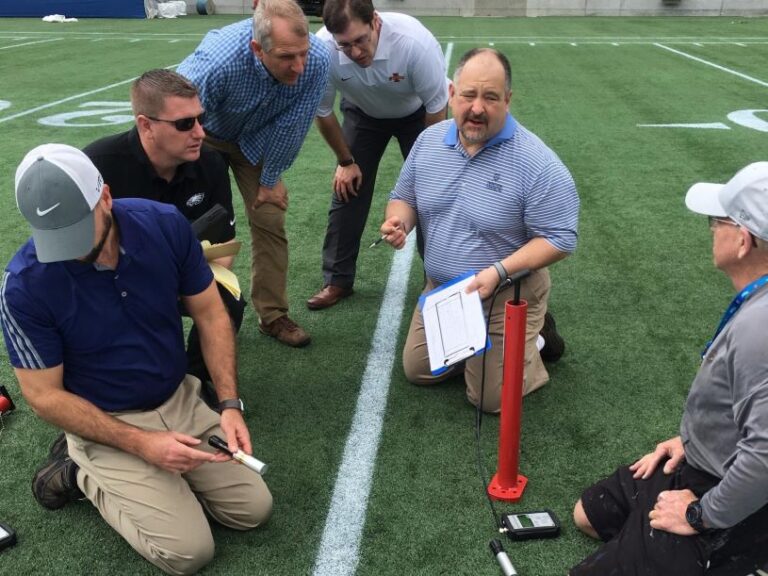Andrew McNitt, Ph.D., professor of soil science, director of the Center for Sports Surface Research and technical adviser to the National Football League (NFL), retired from Penn State after a 40-year career in the College of Agricultural Sciences.
McNitt came to Penn State in 1979, and, after earning a bachelor’s degree in horticulture, served as an extension educator in Philadelphia County, where he worked on ornamental horticulture and sports turf management.
He went on to earn a master’s degree and a doctorate from Penn State, focusing on methods of characterizing traction on athletic field surfaces and improving the stability of sand-based sports fields and hybrid natural/artificial turf surfaces. In 1998, McNitt became a faculty instructor and helped create Penn State’s World Campus turfgrass curriculum.
In 2000, he joined the former Department of Agronomy as an assistant professor of soil science and, over the next 23 years, served as a faculty member and mentor to more than 1,000 turfgrass students.
McNitt’s research focused on athletic field surface characterization and golf-green construction and maintenance. He established the Center for Sports Surface Research, an intercollege program managed within the Department of Plant Science, with assistance from graduate students and Tom Serensits, manager of the center and a former assistant field manager for the Philadelphia Eagles. The center is a primary source of information on sports field surface-related injuries and research on assessing field conditions for major sporting events.
In 2006, McNitt began serving as technical adviser to the NFL field managers organization. In 2011, he co-authored the NFL’s Mandatory Practices for both synthetic and natural turfgrass playing surfaces, which became the basis for the league’s field certification program. He has consulted with the league on field safety and construction, and he said he plans to continue to help administer the league’s field certification program, monitoring an online database that contains information about real and synthetic NFL turf prior to game days.
The goal of the database is not only to keep fields consistent across every professional football stadium but also to help inform a growing body of research about the relationship between sports injuries and turfgrass, McNitt explained. NFL statisticians use the database to find emerging patterns between injuries and conditions on the field.
His efforts have made an impact throughout the league, according to NFL colleagues.
“Andy has been, and will continue to be, a leader and advocate for surface safety,” said Tony Leonard, director of grounds for the Philadelphia Eagles. “At the professional level, he is a leader in ongoing surface research related to player safety, and he provides honest feedback and guidance to all of us as we strive for safe fields of all types. It has been an honor and privilege to have worked alongside Andy over the years.”
Allen Johnson, fields manager for the Green Bay Packers, said McNitt’s impact on improving game-day playing surfaces in the NFL and sports field management is far-reaching.
“He has become a major go-to source within the industry for his perspective on a multitude of issues,” Johnson said. “With Andy, you can count on feedback that is based on sound science and practical experience. His former students, many of whom became NFL sports field managers, carry his torch of common-sense knowledge, passion and dedication to pushing boundaries in the pursuit of perfection every game day.”
Beyond conducting research and consulting, McNitt devoted himself to students throughout his Penn State career and was inducted into the college’s Academy of Teaching Excellence. He served as program coordinator for both the undergraduate turfgrass science major and World Campus turfgrass programs, as well as networked to help students find jobs in the industry after graduation.
“Andy’s success in helping place our students in key positions in the turf industry is remarkable and is one of the main reasons for our success in attracting students to the major,” said Erin Connolly, professor and head of the Department of Plant Science. “His career at Penn State has been one of innovation, outreach and excellence in classroom instruction. He is known throughout the world as a leader in the development of methods to characterize sports turf surfaces, which has led to improvements in design, function and safety of athletic fields from professional stadiums to high school fields.”
As a pioneer in sports surface research, McNitt has been honored nationally by the Golf Course Superintendents Association of America, the Musser International Turfgrass Foundation, the Crop Science Society of America, the American Society of Agronomy and the Sports Turf Managers Association. He also is active in the Sports Turf Managers Association.
“We are deeply grateful for the contributions Andy has made to the college, our department and the turf program, which is recognized as a national leader in turf research and education,” Connolly said.
In retirement, McNitt said he plans to help several NFL venues prepare for hosting the 2026 FIFA World Cup soccer tournament and to continue managing his family’s farm.
Article by Krista Weidner, Penn State


